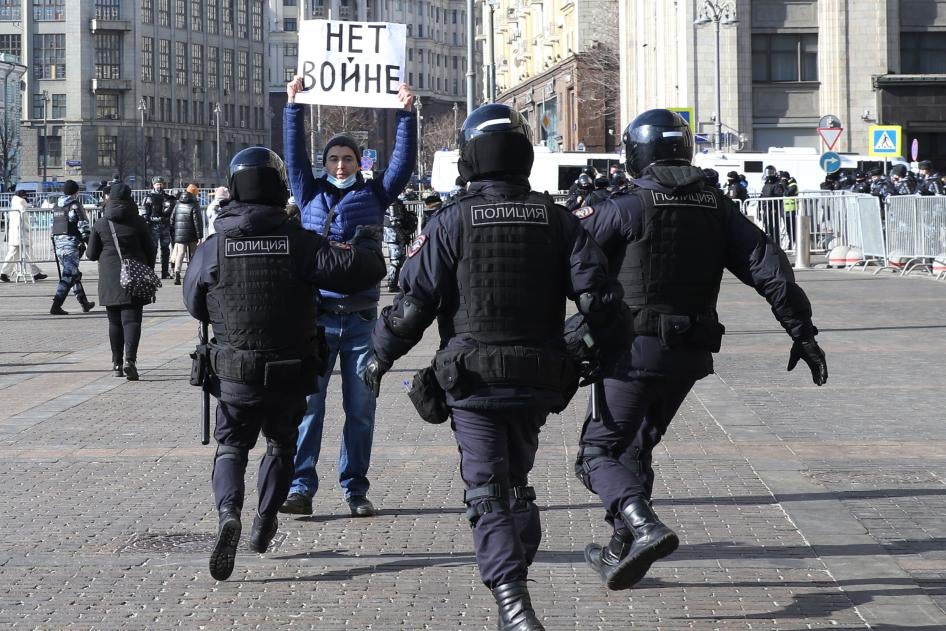(Berlin, January 12, 2023) – The Kremlin’s full-scale invasion of Ukraine marked the start of a new, all-out drive to eradicate public dissent in Russia, Human Rights Watch said today in its World Report 2023.
Russian authorities adopted a broad range of new laws introducing war censorship. These laws provided for long prison sentences for “offenses” such as referring to the armed conflict in Ukraine as a “war,” criticizing the invasion or the conduct of Russian armed forces, and reporting on war crimes by the Russian military or on Ukrainian civilian casualties.
“Against the backdrop of war, Russian authorities doubled down on their relentless attack against dissent and civic activism,” said Rachel Denber, deputy Europe and Central Asia director at Human Rights Watch. “The Kremlin clearly aims to silence any public opposition to the war, any criticism of the government, or any expression of social nonconformism.”
In the 712-page World Report 2023, its 33rd edition, Human Rights Watch reviews human rights practices in close to 100 countries. In her introductory essay, acting Executive Director Tirana Hassan says that in a world in which power has shifted, it is no longer possible to rely on a small group of mostly Global North governments to defend human rights. The world’s mobilization around Russia’s war in Ukraine reminds us of the extraordinary potential when governments realize their human rights obligations on a global scale. The responsibility is on individual countries, big and small, to apply a human rights framework to their policies, and then work together to protect and promote human rights.
Russia was suspended from the United Nations Human Rights Council, was expelled from several other international bodies, and left the Council of Europe. At home the authorities projected a “besieged fortress” mentality, amplified rhetoric claiming malevolent foreign influence, and adopted bills with measures akin to the Soviet-era ban on foreign contacts.
New laws further expanded the scope of the pernicious legislation that labels individuals or groups with the toxic “foreign agents” label, introduced criminal provisions for “confidential cooperation” with international and foreign organizations almost on par with the punishments for high treason, and gave the authorities even broader grounds to put activists behind bars.
An opposition politician, Vladimir Kara-Murza, became the first person to be charged with treason solely for criticizing the Kremlin and Russia’s invasion of Ukraine. Kara-Murza has been in custody since April 2022.
Law enforcement responded to nationwide, peaceful protests against the war with violence, mass arrests, and administrative and criminal prosecutions. The authorities opened hundreds of criminal cases on bogus charges of “false information” or “discreditation” of Russian armed forces. Thousands of people served time under administrative sentences or were ordered to pay fines on these charges. An opposition politician, Ilya Yashin, was sentenced to eight-and-a-half years in prison, and Aleksey Gorinov, a Moscow municipal council member, was sentenced to seven years in prison, both on “false information” charges. Both were convicted for anti-war speech and public criticism of Russian forces’ attacks on civilians. An activist Alexandra Skochilenko has been detained since April on the same charges.
Independent Russian and foreign media outlets, which had started to leave Russia shortly after the invasion, escalated their departure after the laws’ adoption due to concerns for journalists’ security. Russian authorities continued to censor online critics by misusing the government’s authority to block online content.
Russian authorities also continued to expand the list of organizations blacklisted as “undesirable” and for the first time sentenced activists to prison terms for alleged involvement with such organizations. In May, a court sentenced Mikhail Iosilevich to 20 months, and in July, Andrey Pivovarov, the former executive director of the Open Russia Civic Movement, was sentenced to 4 years.
Russian authorities also proposed new legislation that would further discriminate based on sexual orientation and ramped up homophobic and anti-migrant rhetoric.
In April, Russian authorities revoked the registration of 15 foreign nongovernmental organizations and foundations, including Human Rights Watch and Amnesty International, forcing them to shut their offices in Russia.
The authorities abused Russia’s overbroad counterterrorism and counterextremism laws to retaliate against the political opposition, dissenting voices, and religious minorities. Officials opened bogus criminal cases on “extremist” charges against the imprisoned opposition leader Alexei Navalny and several of his aides and supporters. Lilia Chanysheva, the former head of Navalny’s team in Ufa, has been in pretrial detention since November 2021.
In March, the authorities blacklisted Meta, the parent company of Facebook, Instagram, and WhatsApp, as “extremist.” The authorities also continued to prosecute people accused of affiliation with religious organizations designated as “terrorist” or “extremist” even though neither the groups nor the accused had espoused or been linked to violence.
Chechen authorities brutally quashed dissent at home, while Chechnya’s leader, Ramzan Kadyrov, openly called for Russia to commit abuses that would constitute war crimes.
Russia remained one of the world’s top 10 emitters of greenhouse gases, contributing to the global climate crisis. Massive forest fires again affected various regions of Russia in 2022. A group of environmental activists lodged the first climate lawsuit against the government, demanding radical reduction of Russia’s greenhouse gas emissions.









